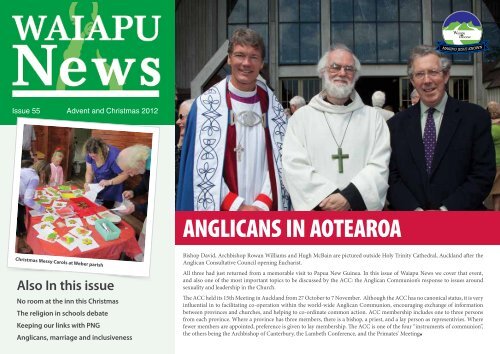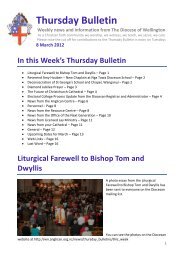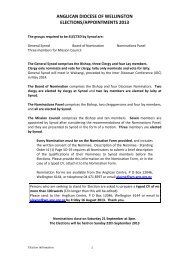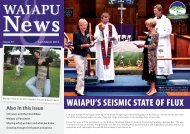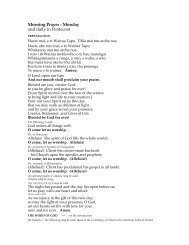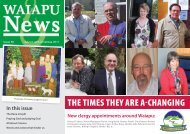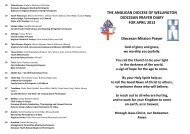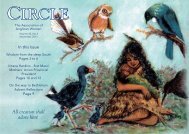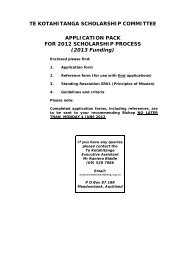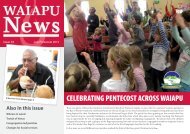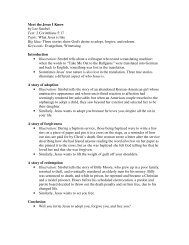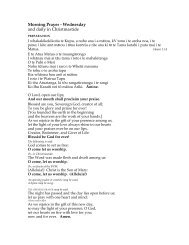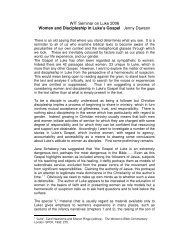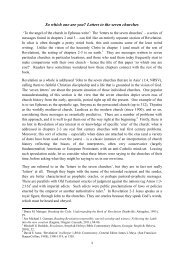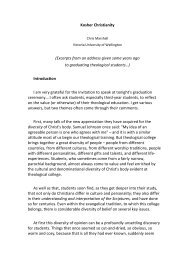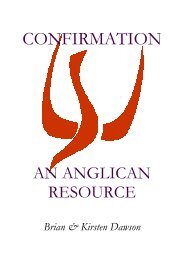ANGLICANS IN AOTEAROA - Waiapu Anglican Social Services
ANGLICANS IN AOTEAROA - Waiapu Anglican Social Services
ANGLICANS IN AOTEAROA - Waiapu Anglican Social Services
Create successful ePaper yourself
Turn your PDF publications into a flip-book with our unique Google optimized e-Paper software.
Issue 55 Advent and Christmas 2012<br />
<strong>ANGLICANS</strong> <strong>IN</strong> <strong>AOTEAROA</strong><br />
Christmas Messy Carols at Weber parish<br />
Also In this issue<br />
No room at the inn this Christmas<br />
The religion in schools debate<br />
Keeping our links with PNG<br />
<strong>Anglican</strong>s, marriage and inclusiveness<br />
Bishop David, Archbishop Rowan Williams and Hugh McBain are pictured outside Holy Trinity Cathedral, Auckland after the<br />
<strong>Anglican</strong> Consultative Council opening Eucharist.<br />
All three had just returned from a memorable visit to Papua New Guinea. In this issue of <strong>Waiapu</strong> News we cover that event,<br />
and also one of the most important topics to be discussed by the ACC: the <strong>Anglican</strong> Communion’s response to issues around<br />
sexuality and leadership in the Church.<br />
The ACC held its 15th Meeting in Auckland from 27 October to 7 November. Although the ACC has no canonical status, it is very<br />
influential in to facilitating co-operation within the world-wide <strong>Anglican</strong> Communion, encouraging exchange of information<br />
between provinces and churches, and helping to co-ordinate common action. ACC membership includes one to three persons<br />
from each province. Where a province has three members, there is a bishop, a priest, and a lay person as representivies. Where<br />
fewer members are appointed, preference is given to lay membership. The ACC is one of the four “instruments of communion”,<br />
the others being the Archbishop of Canterbury, the Lambeth Conference, and the Primates’ Meeting■
From Bishop David<br />
Bridge Crossings<br />
During the recent powhiri for ACC-15<br />
in Auckland, a number of students<br />
from <strong>Anglican</strong> Schools asked<br />
questions of three leaders in our <strong>Anglican</strong><br />
Communion: Rowan Williams, the Archbishop<br />
of Canterbury, Katharine Jefferts Schori, the<br />
Presiding Bishop of the Episcopal Church<br />
(US), and Thabo Makgoba, the Achbishop of<br />
South Africa.<br />
One question was: “What does a bishop<br />
do?” Each of the aforementioned responded<br />
thoughtfully and eloquently; however the<br />
response I most readily remember came<br />
from Katharine: “We build bridges.” I’m not<br />
altogether sure, with all due respect to the<br />
Presiding Bishop, if we are the builders of<br />
bridges, or if it is Atua who engages in such<br />
construction. I suspect it is God, but I do think<br />
the response has great merit. I truly believe,<br />
and I suggest my experience supports my<br />
claim, that episcopal ministry, to which we are<br />
all called, involves locating the bridges erected<br />
by God and crossing over them, together and<br />
to one-another.<br />
For six days Hugh McBain and I enjoyed the<br />
absolute pleasure of accompanying Archbishop<br />
Rowan and Dr Jane Williams in Papua New<br />
Guinea. In PNG, whether it was addressing the<br />
3,000 gathered for Eucharist at Resurrection<br />
Cathedral in Popondetta, or responding to<br />
a welcome by locals in a nearby village, or<br />
offering words at the ground-breaking for<br />
a new teacher’s college, or addressing those<br />
gathered at the opening of a new hospital, or<br />
speaking to students and teachers at Newton<br />
Theological College, the ABC’s opening words<br />
were always the same: “I welcome you in the<br />
name of Jesus Christ!” And without exception<br />
the response was great and wonderful<br />
acclamation. It was again an experience to hold<br />
in one’s heart, a moment-in-time, watching<br />
Archbishop Rowan “crossing the bridge”, so<br />
that neither time, space, distance, culture nor<br />
anything would separate God’s people.<br />
And it was equally so once the Archbishop<br />
landed in Aotearoa; during the powhiri he<br />
stood to address us with the words: “I welcome<br />
you in the name of Jesus Christ!” And I heard,<br />
and I encourage you to do the same: “I have<br />
crossed the bridge and I ask that you cross it<br />
with me.......”<br />
On behalf of Tracy, Ian and Zoe, I want to<br />
take this opportunity to express my sincere<br />
gratitude for your thoughts and prayers since<br />
The Archbishop of Canterbury processing<br />
out of Popondetta Cathedral<br />
the death of my brother John. As I have written<br />
in E-News, such an unexpected end of life and<br />
loss of a family member is particularly difficult<br />
due to distance; however again, we have felt<br />
the comfort and care of you our whanau here.<br />
And for that we are exceedingly fortunate and<br />
extremely thankful■<br />
Arohanui, +David<br />
Youth Interns update - Amazing ACC Adventures for Saachi and Hayden<br />
By Jocelyn Czerwonka<br />
There are times I would like to be a fly<br />
on the wall and see for myself just what<br />
amazing adventures our youth interns<br />
get up to. Saachi and Hayden experienced two<br />
weeks as youth stewards for the 15th gathering<br />
of the <strong>Anglican</strong> Consultative Council (ACC)<br />
in Auckland. Delegates came from all parts of<br />
the world and Hayden and Saachi were among<br />
the 18 youth stewards helping to make sure<br />
visitors were looked after and every thing ran<br />
smoothly. First, a training day taught them<br />
everything there is to learn about being a<br />
ACC Youth steward, from knowing all about<br />
emergency plans and fire exits to how to<br />
respond to questions and queries from visitors.<br />
With only a few weeks left of their internship<br />
they still have a lot to pack in. Saachi will<br />
be completing her EIDTS paper on Music<br />
and Ministry and Hayden is completing his<br />
Youth Workers paper through Workforce<br />
Development in Napier.<br />
Saachi is based at Gate Pa for her final<br />
placement, where she has been singing her<br />
songs, leading the Lord’s Prayer in Maori,<br />
doing children’s talks and activities, helping<br />
at the Op Shop and pre-school music and lots<br />
more. She spends a day a week at the Whanau<br />
Aroha Childcare Centre and last week sat<br />
down with an old guitar and made up songs for<br />
the children to join in with.<br />
Hayden has been balancing his study with<br />
involvement at St Luke’s Havelock North and<br />
helping at Kiwi Adventure. He recently spent<br />
a week in Bay of Plenty and helped with the<br />
Ohope Beach Camp for LT4Youth (Leadership<br />
Training for Youth).<br />
Both interns are now thinking about the year<br />
ahead and what they might do. The end of their<br />
internship will be acknowledged at the Cathedral<br />
Service on the 30th of November at 7pm■<br />
Saachi and Hayden on<br />
duty at ACC as youth stewards<br />
2 Issue 55 <strong>Waiapu</strong> News
Oro Oro Oro!<br />
Hugh McBain writes of his and Bishop David’s October<br />
trip to strengthen <strong>Waiapu</strong>’s links with Papua New Guinea<br />
“Oro Oro Oro!” These are the words Bishop David and I heard<br />
over and over again when we visited the <strong>Anglican</strong> Church of<br />
Papua New Guinea recently. Oro means welcome and the<br />
crowds shouting these words were welcoming the Archbishop<br />
of Canterbury and Dr Jane Williams. As the convoy of vehicles<br />
passed through villages and settlements, flowers had been spread<br />
along the road and we were showered with flowers, foliage and<br />
water as we passed by. The weather was hot, the humidity high<br />
and the smell of frangipani intense from the leis put round our<br />
necks at each port of call.<br />
We were privileged to have been invited by PNG Archbishop<br />
Joe Kopapa to join the Archbishop of Canterbury’s party for the<br />
main part of their visit. We joined in the welcome by Bishop<br />
Peter Ramsden and the clergy and people of Port Moresby,<br />
which consisted of a service in the chapel at the Diocesan<br />
Headquarters followed by an exchange of gifts and a meal.<br />
Bishop David had brought gifts from <strong>Waiapu</strong> consisting of a<br />
chalice from the Te Puke parish, a chalice and paten from the<br />
Diocese, a complete set of stoles and chasubles donated by the<br />
Reverend Brian Hamilton and a sesquicentennial tile. These<br />
gifts were gratefully received by Archbishop Joe.<br />
On the next morning, a Sunday, we flew to Popondetta with<br />
Archbishop Rowan’s party which consisted of his wife Jane,<br />
Canon Joanna Udal, the Archbishop’s Secretary for <strong>Anglican</strong><br />
Communion affairs, Fiona Millican, the <strong>Anglican</strong> Communion<br />
Liaison Officer and Bishop Jonathan Meyrick from the Diocese<br />
of Norwich in England, a diocese with a long established link<br />
with the <strong>Anglican</strong> Church of PNG. We and Canon John Deane,<br />
head of the Australian Board of Missions, were included in this<br />
group of international guests.<br />
As can be imagined, the welcome for Archbishop Rowan<br />
and the group was amazing at every place we visited or<br />
passed through. A highlight was the three hour service at the<br />
Resurrection Cathedral in Popondetta. The Cathedral is like an<br />
enormous haybarn with no sides and only the east end closed<br />
off; all the singing was unaccompanied. The service began with<br />
long processions of Archbishops, Bishops (each escorted by two<br />
girls in traditional dress), clergy and laity. The <strong>Anglican</strong> Church<br />
of Papua New Guinea is Anglo Catholic by tradition and the<br />
service reflected this. Dancers in traditional dress were part<br />
of the service, as well as children, the clergy wives, and a wide<br />
range of Diocesan groups, including members of the Society of<br />
St Francis, the Melanesian Brotherhood and the Sisters of the<br />
Visitation of Our Lady.<br />
After the service Archbishop Rowan paid his respects to the<br />
memorial to the Second World War <strong>Anglican</strong> Martyrs of Papua<br />
New Guinea and spoke of the statue of the only indigenous<br />
martyr, Lucien Tapiedi, who, with nine other twentieth century<br />
martyrs from the worldwide church, is installed above the west<br />
door of Westminster Abbey in London. This was followed by<br />
lunch, entertainment and the presentation of so many gifts<br />
that we wondered how they would all be transported back to<br />
Lambeth Palace!<br />
The next day involved a number of visits to Church institutions<br />
including a new hospital, Newton Theological College and a visit<br />
to the Franciscans, the Melanesian Brothers<br />
and the Sisters of the Visitation of Our<br />
Lady. This was particularly important for<br />
Archbishop Rowan as he has been involved<br />
with the Franciscans since his student days.<br />
Also during this visit we were able to do<br />
some essential planning with the Bishops<br />
of Port Moresby and Popondetta for a visit<br />
by a team from the parish of Havelock North<br />
which we hope will take place next year.<br />
For both of us this was the experience of<br />
a lifetime which has strengthened the ties<br />
between <strong>Waiapu</strong> and the <strong>Anglican</strong> Church<br />
of Papua New Guinea. Oro, oro, oro will be<br />
ringing in our ears for some time to come!<br />
Bishop Lindesley Ihove, Diocese<br />
of Popondetta, and Hugh McBain<br />
on the diocesan ute.<br />
Bishop Jonathan Meyrick, Norwich,<br />
Jane and Archbishop Williams<br />
and Archbishop Joe Kopapa<br />
Issue 55 <strong>Waiapu</strong> News<br />
3
But what are we going to do about it?<br />
Oenone Woodhams discovers that there’s more than a cheery face to the new vicar of Taradale<br />
Steve Hayes is a man with a fascinating<br />
journey. Born in Birmingham, a theology<br />
student at Durham University, 20 years<br />
in the Cotswolds and now Vicar of Taradale,<br />
Steve’s life has been Gospel-focused in creative<br />
and missional ways.<br />
After much travail with NZ immigration,<br />
Steve, wife Rosie and youngest daughter Amy<br />
arrived in Taradale in time for his installation<br />
in August. What led him to the other side of<br />
the world? Especially as he was leaving behind<br />
a much loved role in education and two other<br />
daughters, Sarah and Jessica.<br />
4 Issue 55 <strong>Waiapu</strong> News<br />
Until coming to New Zealand Steve was a<br />
school chaplain and maths teacher. He became<br />
a Christian through the Crusaders youth<br />
movement, and while at boarding school was<br />
deeply influenced by a priest on the school<br />
staff. He saw good models of chaplaincy, how<br />
to be a priest in a school setting, and how to be<br />
an effective housemaster.<br />
From Durham University he went straight<br />
into education, and except for three years with<br />
Scripture Union his role was half chaplaincy<br />
and half teaching: teaching maths and<br />
John Flavell and Steve hongi at Steve’s induction.<br />
responsibility for daily chapel and pastoral<br />
care for students and staff. As Steve describes<br />
it, ‘teaching maths gave me street cred with my<br />
colleagues’. His forte was helping students who<br />
were reluctant mathematicians and he also ran<br />
classes for their parents. Steve and Rosie, an<br />
ESOL teacher, also ran a boarding house at<br />
the school for 14 years. For a while Steve felt<br />
as if he had 43 daughters, not three. For the<br />
last six years he has been Head of Transition<br />
at a primary school that was making the move<br />
to secondary, but still held a dual chaplaincy /<br />
maths role.<br />
When Steve first became a chaplain he was<br />
not ordained, which was very unusual in the<br />
UK. He was an active lay minister in his local<br />
parish team, but in 1999 he was deaconed in<br />
the Oxford Diocese and priested the following<br />
year. Ordination impacted on his parish work<br />
as well as his school role. He no longer had to<br />
bring priests in for communion services, so the<br />
role was more integrated. Steve noticed that<br />
ordination in the secular world does change<br />
people’s attitudes and provides opportunities<br />
for connection that may not otherwise be<br />
evident.<br />
The secondary school Steve taught at had 180<br />
students. The staff used to teach ‘Life Skills’,<br />
things like how to wire a plug or do first aid.<br />
Steve’s job was to introduce them to issues<br />
about world poverty, to expand their horizons.<br />
After one lesson Steve said, ‘well it’s one thing<br />
to learn about these issues, but what are we<br />
going to do about it?’ And a student replied,<br />
‘We should fill the school minibuses with aid<br />
and drive to Africa’. After some discussion<br />
about practicalities it was decided to drive to<br />
Romania. Steve knew a priest who was working<br />
there, and so it unfolded. The idea snowballed.<br />
Different year groups were given the task of<br />
sourcing items, and the momentum built to<br />
the extent that Steve was often stopped on the<br />
street in Chipping Norton and given money for<br />
the endeavour.<br />
On their first trip four adults drove for three<br />
days and nights with a 42 ton truck filled with<br />
aid, and two minibuses with 18 students who<br />
had all paid their own way. This was only 18<br />
months after Ceausescu was executed, and<br />
conditions in Romania were grim. They stayed<br />
eight days and helped Steve’s friend, the Rev’d<br />
Steven Hughes, in his work. They ran holiday<br />
programmes for Transylvanian gypsies who<br />
did not attend school, and accompanied<br />
Romanian doctors into villages as they were<br />
trying to find and support children with AIDS.<br />
They delivered food and warm clothing to<br />
people who had nothing, but still insisted<br />
that they not depart without a reciprocal gift.<br />
‘The impact on our students, ‘says Steve, ‘was<br />
transformative.’<br />
Steve ran these trips for 10 years. Steve also<br />
brought lace and other craft work, such as<br />
painted eggs, back to the UK to sell. In the<br />
Chapel centenary year, instead of raising money<br />
for a bell, Steve decided to run a year-long<br />
series of concerts to raise money for Romania.<br />
He booked Christian actors, rock musicians,<br />
magicians, and even a group of ‘strong men’<br />
who lifted Steve’s car in the air. One of the best<br />
‘acts’ was a question and answer session with<br />
the Archbishop of Canterbury. A further spin<br />
off from the concert year was that two local<br />
parishes started youth groups, knowing that<br />
continued over page
Waikohu – a sign of things to come<br />
Following the recent Diocesan Parish review, Noel Hendery and Oenone Woodhams reflect on their time with the people of Waikohu.<br />
Te Karaka is just off State Highway 2, the<br />
road from Gisborne to Opotiki. Drive<br />
into the centre of the community and<br />
every shop is empty. Turn down School Road<br />
and you come to the Area School on the right<br />
(soon to be moved in with the College across<br />
town) and St John’s Church on the left. No<br />
empty buildings in this part of the village. This<br />
is where people gather.<br />
40 kilometres further along the Gisborne –<br />
Opotiki highway is Matawai. Small, isolated;<br />
but on a Friday morning it is actually bustling.<br />
There is a bunch of men in fluro jackets outside<br />
the takeaway shop. A mini bus is surrounded<br />
by cyclists loading their bikes onto a trailer to<br />
be taken inland to ride the cycle tracks. The<br />
pub looks cared for. Turn left past the tiny<br />
police station and you find the picturesque St<br />
Mary’s community church.<br />
Another ten minutes drive inland takes you<br />
to Motu, with its own little church, St Paul’s,<br />
now disconnected from the electricity grid and<br />
used occasionally for weddings.<br />
To the passer-by this is the rural co-operating<br />
parish of Waikohu.<br />
A typical sunset parish, suffering from the<br />
decline of the institutional church and rural<br />
depopulation?<br />
Or a hopeful sign of the church of the future?<br />
The Parish of Waikohu has a lot to struggle with.<br />
There are not many jobs on offer in Te Karaka,<br />
and no obvious signs of future development.<br />
And St Mary’s Matawai is supported by a small<br />
number of farming families with few signs of<br />
potential growth. They are “hanging in there”<br />
says one of its members.<br />
But Waikohu has two hopeful ingredients<br />
in its mix. It crosses boundaries with<br />
unselfconscious ease – boundaries of race,<br />
culture, income and denomination, and it is in<br />
touch with its community.<br />
The local priests symbolise this recipe of hope.<br />
Rev’d Patricia Davidson, English immigrant<br />
school teacher, who has made Te Karaka home<br />
since arriving 37 years ago and Rev’d Frank<br />
Ngatoro, local man, young enough to be Pat’s<br />
son. A tight team bound by faith, affection and<br />
shared commitment.<br />
Another sign of hope is the way the ministry<br />
support team and parish council work<br />
together. There is no sense that one worship<br />
centre dominates to the detriment of the other.<br />
But perhaps the most interesting indicator of<br />
shared mission is the offering of different styles<br />
of worship to meet the diverse needs of a diverse<br />
community. <strong>Services</strong> range from free flowing<br />
family worship, to<br />
healing services,<br />
to the <strong>Anglican</strong><br />
Eucharist. At<br />
Te Karaka these<br />
services are led by<br />
a talented music<br />
group.<br />
Interesting<br />
ideas are being<br />
floated for the<br />
underutilised<br />
church at Motu –<br />
a museum for the<br />
cycle tourists, perhaps.<br />
A hopeful sign of the church of the future?<br />
Numbers at Te Karaka are growing, people<br />
come from as far away as Gisborne, the<br />
Sunday School is booming, there is vibrant<br />
St Mary’s Matawai;<br />
youth ministry and all who attend find a warm<br />
welcome.<br />
As an effective LSM/Co-operating Parish,<br />
Waikohu embodies a way of being church for<br />
the future in Aotearoa / New Zealand■<br />
St Paul’s Motu<br />
once a month there would be something good<br />
to take them to. These groups are still going.<br />
Steve loves organising events to promote the<br />
gospel; he likes hands on Christianity, seeing<br />
faith put into action. He has also spent time as<br />
a rep for TEAR Fund and is heavily involved<br />
in ‘Christians in Sport’. The organisation runs<br />
sport camps and teaches high level sport,<br />
combined with Bible based teaching. They<br />
use sport as a conduit for the gospel. Steve’s<br />
passion for sport remains, he has already found<br />
a squash partner in Taradale.<br />
Why Taradale? ‘I resisted parish ministry<br />
all my life because at heart I’m a teacher and<br />
love being in schools.’ Then last year he and<br />
Rosie came to the realisation that it was time<br />
to move on. A friend who had emigrated to<br />
New Zealand emailed him about the position<br />
in Taradale. It came totally out of the blue, but<br />
as is the case when God has a hand in it, here<br />
he is.<br />
The welcome from the parish, the Diocese<br />
and the community has been overwhelming.<br />
His picture of Taradale parish life is of ‘embers<br />
being fanned into flame’. He says he feels the<br />
parish is waiting and eager to learn about God,<br />
and he would like to be a part of that. In his<br />
first sermon, on a whim, Steve set homework.<br />
30 people did it and gave it to him for marking!<br />
And they want to know when there is more.<br />
Youngest daughter Amy has now returned to<br />
the UK for university, but all three daughters<br />
are coming out for Christmas.<br />
We warmly welcome Steve and Rosie to<br />
<strong>Waiapu</strong>, may your life and ministry here be<br />
blessed■<br />
Issue 55 <strong>Waiapu</strong> News<br />
5
<strong>Anglican</strong>s, marriage, sexuality and inclusion<br />
The Ma Whea Commission on Sexuality and Ordination, set up by General Synod, has begun its work, and marriage equality<br />
legislation has been introduced to Parliament. Stephen Donald reflects on marriage, sexuality and inclusion.<br />
Louisa Wall’s Marriage (Definition of Marriage)<br />
Amendment Bill has moved same-gender unions and<br />
the very nature of marriage itself from ‘in-house’ Church<br />
matters to national debate. That changes to the legal definition<br />
of marriage might impact on our churches is not a bad thing, as<br />
we cannot ignore our times and context.<br />
Many notions of marriage can operate within the same<br />
communities, or within the same Church or congregation, and<br />
these may change over time. More than 30 years ago I remember<br />
a couple in their mid 60s emerging from the local post office<br />
waving a crisp new marriage certificate. They had brought up<br />
their own six children, and were now great-grandparents. But<br />
they needed to make their union ‘official’ in order to receive full<br />
pension entitlements, despite being ‘married’ for years in the<br />
eyes of the local community.<br />
Earlier this year at a tangihanga, some whanau members were<br />
faced with a difficult choice; remaining to honour their uncle, or<br />
travelling as planned to their gay relative’s civil union ceremony<br />
in Auckland. Everyone referred to this as a ‘wedding’, although<br />
clearly, under present law, a marriage between two people of the<br />
same gender cannot take place.<br />
We assume Christian marriage has remained a static institution<br />
from the beginning of time, because it ‘says so in the Bible’.<br />
Yet we read in the Old Testament that a man may have several<br />
wives, that he may take concubines and that if his wife fails to<br />
provide him a child he may seek out another woman with whom<br />
to bear children. Any number of the Bible’s ‘heroes of the faith’,<br />
including Abraham, Jacob, David, and Solomon, had concepts<br />
of marriage different from what we find acceptable today.<br />
Further, the apostle Paul, who says more about marriage than any<br />
other in the New Testament, is not well disposed towards matrimony.<br />
Marriage is at best a curb on our passions and all too often a<br />
distraction from our duties to the Lord. Paul writes that “those who<br />
marry will experience distress in this life, and I would spare you that”.<br />
So discerning ‘what the Bible says about marriage’ is not<br />
an easy task. Add to that mix a medieval emphasis on<br />
virginity, fertility and property rights, Victorian ideas of<br />
romantic love, the mid-20th century sexual revolution,<br />
gay liberation, present-day de facto relationships and an<br />
increasing variety of options for conception, and ‘Christian<br />
marriage’ has a very confused background.<br />
I have not always been in favour of same-sex marriage,<br />
but for opposite reasons from those who hold marriage<br />
to be only between a man and a woman. To me, marriage<br />
smacked far too much of misogyny, heterosexism,<br />
patriarchy and consumerism to be redeemed, and should<br />
not be appropriated by same-gender couples. I have<br />
conducted or attended many weddings which were much<br />
more about the wedding trimmings than relationship,<br />
and have seen inside many households where the<br />
married state was an excuse for violent and abusive<br />
behaviour. As theologian Dale Martin says, ‘there are no clean<br />
words’ and marriage was just too heavily soiled. And with civil<br />
unions, matrimonial property and other legal provisions, surely<br />
same-gender couples and those in de facto relationships already<br />
have enough protection under New Zealand law?<br />
But recent reading, observation and reflection have shifted my<br />
views. The blessing of same-gender relationships is already<br />
common in the Episcopal (<strong>Anglican</strong>) Church in the USA and<br />
will soon be adopted nationally, despite these unions often<br />
lacking legal status. Some US states allow same-sex marriage<br />
or civil unions, but Federal law doesn’t protect these couples or<br />
recognise their unions for health, tax or retirement purposes.<br />
Countries as diverse as South Africa, Iceland and Spain have<br />
full marriage equality, and others, like Israel, recognise samesex<br />
marriages conducted in other jurisdictions. It is messy,<br />
inconsistent and often contradictory, but marriage equality,<br />
as attested to by Barack Obama, is something whose time has<br />
arrived.<br />
Retired Ugandan bishop Christopher Senyonjo leads a contingent of<br />
Episcopalians in the 2012 San Francisco Gay Pride Parade.<br />
In the past, race, gender, disability, age,<br />
education and class have been used as barriers to full inclusion<br />
at the Lord’s Table, and participation in ministry, including<br />
ordination. Given that we gay, lesbian and transgender people<br />
make up only a small proportion of our congregations and<br />
clergy, why does this matter at all? Would it be better for us to<br />
go away and stop causing trouble? In many cases this is exactly<br />
what has happened. Others remain; often living short of their<br />
God-given potential. As the body of Christ we are constantly<br />
challenged by justice issues, and we need to come to grips with<br />
how we understand sexual orientation and gender diversity,<br />
especially in relation to marriage and ordination.<br />
We cannot really know how Jesus would respond to our present<br />
conundrums, although my hunch is he would come down on<br />
the side of justice. To work through these issues effectively we<br />
cannot have hardened hearts or closed minds. I welcome these<br />
discussions and hope we can talk and listen to each other, and<br />
hear the communities we serve, with respect, dignity and trust■<br />
6 Issue 55 <strong>Waiapu</strong> News
Furthering the<br />
discussions in <strong>Waiapu</strong><br />
Following General Synod there are two key areas where<br />
people are invited to contribute to discussions around<br />
sexuality and relationship:<br />
Marriage - Each diocese has been asked “to hold<br />
conversations in our Church and with the wider community<br />
about the nature of marriage, and to explore how the<br />
Church might theologically and liturgically respond to gay<br />
and lesbian <strong>Anglican</strong> couples who request this rite”.<br />
<strong>Waiapu</strong> response – formation of a theological working<br />
group to gather and develop resources which will inform<br />
the wider discussions.<br />
* Regional hui to be held in 2013 prior to Ma Whea<br />
commissioners coming to the diocese.<br />
* Individuals and parishes are encouraged to discuss the<br />
Marriage Amendment Bill with their local M.P’s.<br />
Ma Whea - General Synod Standing Committee has<br />
formed the ‘Ma Whea’ Commission, led by Sir Anand<br />
Satyanand, to summarise the biblical and theological work<br />
done by our Church on the issues surrounding Christian<br />
ethics, human sexuality and the blessing and ordination<br />
of people in same sex relationships, and to report on the<br />
principles of <strong>Anglican</strong> ecclesiology and, in light of our<br />
diversity, the ecclesial possibilities for ways forward for our<br />
Three Tikanga Church.<br />
<strong>Waiapu</strong> response – individuals are encouraged to make<br />
submissions to Ma Whea<br />
* Ma Whea has been invited to visit <strong>Waiapu</strong> later in 2013 to<br />
hear submissions<br />
* Establish a working group to ensure ongoing<br />
communication and sharing of information, and<br />
engagement with the commission.<br />
If you would like further information about<br />
Ma Whea, please contact Jo Crosse jo@waiapu.com or<br />
<strong>Anglican</strong> Church General Secretary, Michael Hughes,<br />
Phone 09 521-4439 Email gensecm@ang.org.nz<br />
The <strong>Anglican</strong> Taonga website: http://anglicantaonga.org.<br />
nz/News/General-Synod/Sir-Anand<br />
From the Ministry Educator<br />
Oenone Woodhams<br />
In August I was fortunate to attend the London Olympics. The world’s moved on with its short attention span<br />
so it’s not really topical news now for this column, and I apologise for that. But the learning and the experience<br />
has stayed with me. Indeed the Theology of the Olympics is influencing my approach to ministry and my<br />
approach to life.<br />
Two hundred and four countries participated in the Olympics; even Syria sent a team, providing some welcome relief no<br />
doubt for that troubled nation. Saudi Arabia sent women athletes for the first time, as did Brunei and Qatar. It is easy to be<br />
caught up in the emotion of such a spectacle, but I don’t think it’s overstating the case to say that in London, for that time,<br />
glimpses of heaven on earth were visible.<br />
So what was different? I have lived in Britain and know London well. I have always thought it was an interesting place, great to visit,<br />
but not particularly friendly. In fact I have experienced it as downright unfriendly, in shops and on the Tube and when trying to ask<br />
people for directions. But from the time we landed at Heathrow, it was as if we had been beamed into an alternate London reality.<br />
If we stood on a street corner and looked even mildly as if we weren’t sure what direction to take people said, ‘Where do you want<br />
to go, can I help?’ When discussing what bus to take while perusing the timetable, a woman told us not only which bus to take but<br />
which was the cheapest option. And most remarkably, people talked to each other on the Tube. It was as if Londoners had taken it<br />
upon themselves to look after all strangers.<br />
At the venues and transport hubs, volunteers cheerfully waved large pink hands and told appalling corny jokes and never lost their<br />
cool with the crowd. Beer flowed freely, but we witnessed no fights or aggressive behaviour. It is remarkable to be sitting in a<br />
stadium of 80,000 people who are all in a good mood. It is remarkable to hear 80,000 people cheering fit to lift the roof as the Saudi<br />
Arabian female runner came running down the track by herself, after everyone else had finished.<br />
Was this heaven on earth? Was this an outworking of God’s plan? Was this a glimpse of how we could be – in relationship with each<br />
other and with God? I can not shake the feeling that it was indeed so. I overheard one woman musing, ‘Wouldn’t it be great if the<br />
United Nations worked like this.’ When I hear of futile UN endeavours to broker peace in Syria, stymied by permanent members<br />
of the Security Council who have no desire for peace, it leaves me wondering if it is just best not to read the news. That of course is<br />
completely the wrong course of action.<br />
We may feel powerless in the face of intractable world problems of rapacious business practice, corrupt governments, and<br />
breathtaking inhumanity, and retreat metaphorically to our ‘safe’ New Zealand where at least we can get up each morning and go<br />
about our business without being in fear of our lives. But I think the Theology of the Olympics calls us to action. It gives us hope<br />
that it is possible to make changes, even though they may be tiny incremental changes, in our responses to people and events around<br />
us. I will be continuing to reflect; and I pray that this incredible experience will have touched people’s hearts from every corner of<br />
God’s earth, by showing that there is indeed another way.<br />
Until next time...Grace and Peace■<br />
Issue 55 <strong>Waiapu</strong> News<br />
7
Farewell, Cliff!<br />
Jenny Dawson talks to our departing Registrar<br />
When I went into his office to<br />
interview Cliff Houston there<br />
was an open Bible on his desk. I<br />
assumed that this was simply a measure of<br />
the importance of his faith to this Diocesan<br />
Registrar. However, he explained that each<br />
morning in the <strong>Anglican</strong> Centre a group of<br />
people meet to say Morning Prayer, a recent<br />
development that obviously gives Cliff a lot<br />
of pleasure. Everyone is welcome, in a work<br />
environment that Cliff says is “very good now<br />
– we have a really great team here.”<br />
He came to this position from being a Chief<br />
Executive in local government, a field he has<br />
worked in for most of his life, apart from a<br />
short time running his own business. Englishborn<br />
Cliff came to New Zealand in 1970 having<br />
met Judy, now his wife, in London where he<br />
was working in accounting. In New Zealand,<br />
he has seen a lot of change and amalgamation<br />
in local body life, especially the reforms of the<br />
late 1980s. The years with the Ruapehu District<br />
Council were particularly challenging, trying<br />
to hold together very different communities.<br />
In local body life, Cliff believes we need<br />
integrated policies and planning for the future,<br />
to use resources in the best way; arguments<br />
about rates and debt tend to sidetrack the<br />
real issues. He has not lost his interest in local<br />
body management, and is a life member of the<br />
Society of Local Government Managers. He is<br />
also a JP, enjoying witnessing documents and<br />
helping people negotiate hurdles, but not doing<br />
court work: “I don’t feel comfortable judging<br />
my fellow man.”<br />
When he came to <strong>Waiapu</strong>, he took over<br />
from Neil Eagles, working with Bishop John<br />
8 Issue 55 <strong>Waiapu</strong> News<br />
Bluck before Bishop David. The Church is an<br />
organisation that fascinates Cliff. He says, with<br />
affection, that he likens it to a jigsaw puzzle<br />
with a lot of pieces that don’t all fit together! It’s<br />
an organisation of human beings which has all<br />
the complex characteristics of humanity, not<br />
necessarily of God, but which means a great<br />
deal to this man.<br />
“I started with faith,” says Cliff. Growing up<br />
with a Catholic mother and <strong>Anglican</strong> father,<br />
about the age of fifteen or sixteen (after his<br />
father’s death) he got disillusioned with the<br />
Catholic church and took twenty years to<br />
come back, this time as an <strong>Anglican</strong>. He says<br />
he made significant growth as a Christian, and<br />
obviously has the church very much at heart.<br />
Cliff enjoys the annual gatherings with other<br />
New Zealand registrars (second year a trans-<br />
Tasman event). This year he will be at their<br />
meeting in Queenstown, along with Colleen<br />
(his successor as Registrar) and Angela, the<br />
new Diocesan Finance Manager, as he prepares<br />
to hand over the reins at the end of the year.<br />
After six years working in <strong>Waiapu</strong>, he and Judy<br />
are moving down to Waikouaiti (allegedly two<br />
degrees warmer than Dunedin!). They have<br />
two sons. One lives in Dunedin, so they will be<br />
near to some of the grandchildren. They also<br />
have two dogs, Cliff ’s German shepherd Koko<br />
who accompanies him on morning walks and<br />
Judy’s Chihuahua Zak who matches the pace.<br />
Cliff is an avid reader, especially historical<br />
and espionage novels and history in general.<br />
He commented there was nothing new in this<br />
world and there are many lessons that could be<br />
learned from history but are sadly ignored.<br />
As Cliff reflects on his time he really regrets<br />
that he is going now, especially because there<br />
will be a lot more change in the next couple<br />
of years with alternative models on church.<br />
“Ruahine is just the beginning and there will<br />
also be major changes in diocesan service<br />
delivery.”<br />
This year the issues around the cost of insurance<br />
have meant much consultation and negotiation<br />
with parishes. “I am really heartened by a lot<br />
of the attitudes that I see in church people,<br />
which were shown in the discussions about<br />
insurance. <strong>Anglican</strong>s are losing their fixation<br />
with property ownership issues and are<br />
getting new interest in doing ministry. There<br />
is more sense of working together now. To a<br />
large extent parish boundaries are becoming<br />
Farewell for Cliff and Judy at St Luke’s Waipaoa.<br />
Cliff with Bryan Jackson.<br />
irrelevant and people will worship w h e r e<br />
they want, with a willingness to find new ways<br />
forward.”<br />
He is also glad to be seeing social services<br />
better integrated into the life of the diocese. He<br />
looks to a future where all diocesan services,<br />
including admin, finance and IT, will have a<br />
core staff rather than be compartmentalised.<br />
Cliff Houston has quietly planted seeds that<br />
will grow. As Registrar, he has nurtured and<br />
tended office matters in Napier and <strong>Anglican</strong><br />
life across the Diocese as he has related to<br />
people in his solid dependable way. He will be<br />
missed. May his years of retirement be creative<br />
and enjoyable. Well done, good and faithful<br />
servant■
Faith and a commitment to mission<br />
Rhondda Poon introduces Peter O’Brien, the new General Manager for <strong>Waiapu</strong> <strong>Anglican</strong> <strong>Social</strong> <strong>Services</strong><br />
The Trustees of <strong>Waiapu</strong> <strong>Anglican</strong> <strong>Social</strong><br />
<strong>Services</strong> are pleased to announce the<br />
appointment of Peter O’Brien to the<br />
position of General Manager.<br />
Peter took up his position in early October<br />
and has since been busy getting to know the<br />
services that <strong>Waiapu</strong> parishes and communities<br />
provide for the people who need them. He is<br />
based in the Napier <strong>Anglican</strong> offices.<br />
Peter is of Tainui (Ngati Raukawa) and Irish<br />
descent and was raised in Tauranga. He<br />
has moved to the Hawke’s Bay with his wife<br />
Pauline, youngest son Ethan and the dog<br />
named Dougal, to live in Havelock North.<br />
There are three older children: Daniel, James<br />
and Micaela who have all left home.<br />
Faith ministry is central to Peter’s life and<br />
prior to coming to <strong>Waiapu</strong> he was employed in<br />
Tauranga as the General Manager Operations<br />
for the Open Home Foundation. This is a<br />
national Christian child and family support<br />
service that has a focus on care and protection<br />
of children. It provides foster care for children<br />
and in more recent times has provided<br />
disability services and parent mentoring.<br />
Peter’s strong faith and devotion to<br />
missional work is at the heart of his<br />
new commitment to <strong>Waiapu</strong> and our<br />
social services. He is very keen that our<br />
organisation, services and approach to our<br />
work all reflect this at every level.<br />
Peter says that it is a privilege to lead this<br />
work on behalf of the <strong>Waiapu</strong> Diocese and he<br />
looks forward to being part of a team that is<br />
committed to supporting and strengthening<br />
the people of <strong>Waiapu</strong>■<br />
Peter O;Brien<br />
Cathedral history<br />
“A parish story”, by Judy Mills,<br />
available from the Cathedral office<br />
This history of the Cathedral Parish,<br />
written to commemorate the 150th<br />
anniversary of “the first English church<br />
in Hawke’s Bay” (H B Herald, 1862), is not the<br />
first Cathedral parish history to be written.<br />
However, it is refreshingly human, revealing<br />
details and filling in past gaps. We quickly<br />
learn of “the first mention of women in the<br />
parish” and of a fund-raising bazaar in 1861<br />
which raised two hundred pounds, twice as<br />
much as the oft-mentioned seeding money<br />
that Selwyn gave on his first visit to Napier.<br />
We are introduced to scandal, feuds, debts and<br />
inadequate numbers of parishioners. We learn<br />
that, by his own admission, the second Dean,<br />
Frank Mayne, had been “a bit of a lad”, having<br />
been “sent down” from both Rugby and Oxford<br />
for misdemeanours.<br />
The extraordinary response of the parish to the<br />
1931 earthquake is revealed. With their Dean<br />
seriously injured, the vestry were planning and<br />
working hard for the future within a month of<br />
the quake.<br />
The constant financial struggle through the<br />
first century of the parish reminds us of the<br />
folly of looking back through rose tinted<br />
spectacles. Falling congregations and tightfisted<br />
parishioners seem to have been the norm<br />
in the cathedral’s first century.<br />
Deaconesses in the early 20th century receive a<br />
well-deserved tribute: “a lonely and demanding<br />
life”, but whose contribution “to the pastoral<br />
care of parishioners, and in teaching the young,<br />
was immense.”<br />
One notable gap, as Judy Mills outlines the role<br />
of the various deans, is the role of her husband<br />
Murray, dean from 1984 until 1991. Judy<br />
coyly mentions some of the achievements of<br />
the period without specifically acknowledging<br />
Murray’s leadership.<br />
While covering the mainstream parish history,<br />
half the book is spent travelling up important<br />
tributaries. For a century Dorcas Society<br />
members sewed garments for the needy,<br />
including children in the <strong>Anglican</strong> children’s<br />
homes and the families of the poorly paid<br />
Maori clergy. The Council of Good Neighbours<br />
was a vehicle in the 1960’s for the new concept<br />
of “lay ministry”. The Women’s Rebuilding<br />
Committee of the Cathedral raised ₤8,000 for a<br />
new cathedral at a time when many considered<br />
such an undertaking an impossible dream.<br />
The Sunday school, first mentioned in 1864,<br />
had up to 35 teachers<br />
on its roll.<br />
In 75 pages, Judy puts<br />
flesh on the bare<br />
bones of a parish’s<br />
story. It reminds<br />
us that there never<br />
was a golden era for our church.<br />
Every generation worries about the future,<br />
about finances, about reaching out to those<br />
untouched by the Gospel; every generation is<br />
plagued by difficult personalities, troublesome<br />
buildings and plans that go awry. The story<br />
of any parish is a story about frail, wellintentioned<br />
people. Judy tells the cathedral’s<br />
story with sympathy and warmth■<br />
Noel Hendery<br />
Issue 55 <strong>Waiapu</strong> News<br />
9
A Century ago in <strong>Waiapu</strong> Church Gazette<br />
Votes for women<br />
Stephen Donald<br />
Efforts were made by <strong>Waiapu</strong> Diocese in the early 1890s to give women full voting rights at parish<br />
meetings, concurrent with the granting of full female franchise in national and local body elections.<br />
<strong>Waiapu</strong> delegates promoted a motion at General Synod in 1892, which was blocked by the primate,<br />
Bishop Octavius Hadfield, who had considered the measure an anathema. Although Bishop Averill<br />
spoke against the motion, he allowed it to pass, unlike his predecessor, Leonard Williams, who had<br />
consistently used his power of veto throughout his episcopacy (1894-1909) to prevent liberalisation.<br />
Full voting rights for women were granted by General Synod in 1919, with Hera Munro (née Stirling)<br />
the first woman to sit in a <strong>Waiapu</strong> synod in 1922. The <strong>Waiapu</strong> Church Gazette of November 1912<br />
reported (abridged):<br />
The Rev. J. Hobbs moved, “That it be a recommendation from this Synod to the General<br />
Synod so to amend the Canons that women may be allowed their right to vote at Parish<br />
meetings.” He was not asking a favour for women, but demanding their just rights and<br />
privileges. He said the vote was a privilege that should be accorded women, and it should be left<br />
to their discretion whether they used it or not. He refused to admit that women were in any way<br />
inferior to men in intellect. They had the same interest in Church matters as men, they had an<br />
equal stake, and should have an equal vote. What reason was there why people should unanimously<br />
approve of women’s franchise in politics and yet shut them out from Vestry elections.<br />
Women were baptised and confirmed as well as men, and should be allowed all lay privileges for<br />
which they had a vocation. The women were the better half of the laity, and they were not allowed<br />
lay privileges. In denying them their rights we were denying ourselves the best assistance we<br />
could have. No other Christian denomination denied to women the same rights of voting as men<br />
possessed. In political matters the women’s vote had proved favourably to purity of legislation. In<br />
Church affairs women did most of the work, and had an equal share with men in the building up<br />
of parochial districts but as soon as these became parishes women were put into the background,<br />
and the votes by men only were admitted. Mr. Fielder [diocesan secretary] seconded the motion.<br />
It had been intended by the framers of the constitution that women should have equal rights with<br />
men.<br />
Mr. Thomas Tanner contended that “parishioners” included women. They had no right to exclude<br />
them, nor did any man dare to exclude them. At a recent meeting of parishioners at Havelock<br />
North it was the little hands of the women that had voted for free seats and had decided the<br />
question. It was absurd to think that a woman might vote for a member of Parliament but not for<br />
a Vestryman.<br />
The Ven. Archdeacon [Herbert] Williams said the question was one not only of right and privilege,<br />
but of principle. Men and women differed in their functions in life, and those women who would<br />
use the privilege would generally be those who did not do Church work, while Church workers<br />
did not desire it. As a matter of fact, he did not think the political enfranchisement of women had<br />
done anything towards improving or purifying politics. He thought the average men and women<br />
were equally good and equally bad, and he did not think the granting of the ecclesiastical franchise<br />
to women would make any difference in Church matters.<br />
The Rev. Kohere said the motion that women should not vote was a relic of the dark ages. In<br />
olden times the Maoris thought women were mere beasts of burden and would not allow them to<br />
speak in the meeting-house, but since the Maoris had become civilised and Christianised they had<br />
learned that women were equal with men. He always taught the Maori women that they owed the<br />
improvement of their position to Christianity, and he was surprised that the Church, which ought<br />
to have led in the matter of giving the franchise to women, had allowed the State to be the first to<br />
grant it, and now grudged to follow the State’s lead.<br />
Dr. Henley supported the arguments of Archdeacon Williams. He thought that if women came<br />
in, men would leave the management of affairs to them. The Rev. Mr Robertshawe thought that<br />
in the heat of argument men would be unable to prevent themselves speaking sarcastically and<br />
discourteously to women. The Rev. Oliver Dean thought it was the old story of the camel getting<br />
in first his nose and then his body into the tent and crowding out the man.<br />
The Right Rev. the Bishop said that ...he did not think female franchise had done much<br />
for politics. He would prefer that in all cases the age for enfranchisement should be 25 or 30 years<br />
instead of 21■<br />
10 Issue 55 <strong>Waiapu</strong> News
Shaken city’s empathy<br />
with land-grab victims……<br />
Earthquakes have taught many Cantabrians<br />
the devastating reality of losing your land abruptly<br />
It is a memory of loss that many <strong>Waiapu</strong> News readers around the Napier area may well have heard from survivors of the 1931 Napier earthquake.<br />
This year as Christian World Service planned their Christmas Appeal they found that in Christchurch it is very easy to feel for people elsewhere<br />
who have lost their land to man-made land grabs.<br />
The Appeal theme this year is “Save My Place.”<br />
“It’s a justice issue that made this year’s theme inevitable once we found 20 million hectares, or about eight New Zealand’s worth of land, had been<br />
land grabbed in the last decade,’’ says CWS national director, Pauline McKay.<br />
Plans to focus on sustainable agriculture as the main focus of the annual Christmas Appeal had been side lined as research showed the severity and<br />
scale of land grabbing.<br />
For just one Pacific example, in Papua New Guinea foreign companies now own 5.2 million hectares, (over 11 per cent) of the total land area of the<br />
country.<br />
Much of this land is traditionally commonly owned and used in developing nations.<br />
“It’s both a call for help and a challenge to people to think about how they would react and feel to losing their land. We are also aware that it is part<br />
of our shared history here in Aotearoa/New Zealand and was part of many of our immigrant stories,’’ said Pauline McKay.<br />
Church supporter packs have been mailed out and the 67th Christmas Appeal is also available online at christmasappeal.org.nz<br />
The land grabs theme builds on the increased focus on food issues from CWS in recent years.<br />
For 70 per cent of the world’s poor agriculture is their food, job and income.<br />
Research has shown world hunger to be not the result of an inability to feed the planet but of a lack of political will to do it fairly.<br />
The world produces 50 per cent more than enough food to feed everyone, with some used for biofuels and 30 per cent just wasted.<br />
In the case of land-grabbed land taken by both countries and corporations, 40 per cent is used for biofuels globally, rising to 60 per cent in Africa.<br />
“It is simply a scandal that as an aid and development agency based in Christian justice principles we have to expose and combat,’’ said Pauline McKay.<br />
The good news in the Christmas Appeal was that people could, and were, fighting back against land grabs with the support of CWS■<br />
SAVE MY PLACE<br />
donate to life now<br />
christmasappeal.org.nz<br />
0800 747 372<br />
Issue 55 <strong>Waiapu</strong> News<br />
11
2012 Still No Room<br />
Christmas Reflection - Rev Alex Czerwonka, Chair of the Rotorua Community Nightshelter Trust and Vicar of St Luke’s<br />
An unplanned pregnancy; an unexpected extra bill to pay; an urgent journey at short notice and suddenly you’re homeless. It happened to<br />
Jesus’ parents, it is still happening today. A lot of people are just three crisis events away from being homeless. Some in Christchurch would<br />
say all it takes is one crisis event! Being homeless may be only temporary; a few days inconvenience, but for a small number of people the<br />
first few days get extended by another crisis or two. A temporary inconvenience becomes a struggle to survive on the streets. Obstacles become<br />
greater, time passes.<br />
Jimmy is a homeless guy I know. He told me that his net weekly income was twenty three dollars, after deductions for emergency advances, compulsory<br />
fine payments, family support and loan repayments. He showed me his bank statement so I know he was not exaggerating. He also showed me a<br />
quote for the cost of renting a flat which, including bond and two weeks rent in advance was $1,500. A quote from the power company to connect<br />
electricity was for over $500. Even with another emergency grant, if he could get one, it was more than he could afford.<br />
The new welfare regulations beginning in July next year, mean benefits will be reduced for those who fail drug tests. This will mean more homeless<br />
people on our streets. There may be good reason for drug testing people, but benefit reductions for those already on the edge will have consequences.<br />
Article 25(1) of the Universal Declaration of Human Rights says “Everyone has the right to a standard of living adequate for the health and well-being<br />
of himself and of his family, including food, clothing, housing and medical care and necessary social services, and the right to security in the event of<br />
unemployment, sickness, disability, widowhood, old age or other lack of livelihood in circumstances beyond his control.”<br />
Jesus said it more succinctly: “Truly I tell you, whatever you did for one of the least of these brothers and sisters of mine, you did for me.” Matthew 25:40.<br />
When you gather reverently around the nativity scene this Christmas, spare a thought for all the other homeless persons, for whom there is still no<br />
room at the inn■<br />
If you want to contribute to the<br />
Rotorua Community<br />
Nightshelter Trust<br />
(NZ Registered<br />
Charity No. CC38007),<br />
send your donation to<br />
PO Box 351 Rotorua.<br />
Donations over $5 are eligible<br />
for a tax reimbursement.<br />
12 Issue 55 <strong>Waiapu</strong> News
Exploring Leadership Training<br />
For Youth<br />
Raising confident<br />
young people,<br />
committed to<br />
faith, service<br />
and leadership’<br />
Sunny days, a beautiful beach, the lovely quietness of St Nick’s, Ohope and nine enthusiastic young people were all the<br />
ingredients needed for a fun and informative LT4Youth Camp. Over two days we explored the LT4Youth modules based on<br />
the Five Marks of Mission and dug a little deeper into scripture and what the modules were all about and how to get involved.<br />
On day one we found ways to ‘Tell Our Story’ through sand art. We explored the historic sites along the Whakatane waterfront,<br />
swam and barbequed at Awakeri hot pools, and explored ‘Faith Formation’ with Lego blocks. That night we watched ‘Soul Surfer’ and<br />
were once more challenged about ‘proclaiming our faith’ and ‘serving others’. On Day 2 we explored practical ways to ‘serve others’,<br />
thought long and hard about ‘social justice’ and how we respond as Christians, and last but not least we collected special<br />
treasures from the beach as we reflected on ‘Caring for Creation’.<br />
Some interesting ideas have followed, such as one young person thinking about<br />
running a ‘technology workshop’ for older members of the church and another<br />
young person keen to run a Christmas Discovery programme. Another two<br />
discovered that ‘Telling Our Story’ can be through actions rather than words and<br />
decided to be rostered as Communion assistants.<br />
It is great to see our young people wanting to find ways to be more involved<br />
in the life of the church and community. LT4Youth is designed to help us as<br />
churches (who sometimes find it difficult to connect with young people) to<br />
find ways to make connections and walk alongside young people on their faith<br />
journey. A large part of LT4Youth is about having the support of mentors.<br />
At least twelve young people are ready to sign up for LT4Youth and more<br />
are keen. We hope many of you will come to the Mentoring Workshops (see<br />
box sidebar) to find out more about getting involved. You may not know a<br />
young person ready for LT4Youth just yet but it’s worth doing the training<br />
and being prepared and available■<br />
Aiming high at the Ohope Beach Camp<br />
The group at the conclusion of their first camp at<br />
St Nicholas’ Ohope<br />
Mentoring<br />
Workshops<br />
23-25 November<br />
Eastland – Hawke’s Bay - Bay of Plenty<br />
Phil Trotter our National <strong>Anglican</strong> Youth Advisor will be<br />
delivering three workshops around <strong>Waiapu</strong> on mentoring.<br />
Whether you are interested in just finding out more or being<br />
a mentor for young people doing Leadership Training for<br />
Youth (LT4Youth) or in another capacity, this workshop is<br />
for you! <strong>Waiapu</strong> is on the lookout for committed Christians<br />
who have a passion for supporting others in a mentoring<br />
role.<br />
The workshops will inform people about the role of a mentor,<br />
requirements to become a mentor and much more. Come<br />
along even if you are not sure if this is for you. We need<br />
people to be informed about mentoring, the possible role<br />
mentoring can play in your church and community, with<br />
young people doing the LT4Youth programme or children<br />
and families.<br />
Workshops are:<br />
Eastland<br />
Friday 23rd November,<br />
ST Marks Hall, Te Hapara from 6pm<br />
Hawkes Bay<br />
Saturday 24th November<br />
All Saints, Taradale starting at 3pm<br />
Bay of Plenty<br />
Sunday 25th November<br />
St Luke’s Rotorua, starting at 12.30 with lunch<br />
For more information contact:<br />
Jocelyn Czerwonka<br />
or<br />
Rev Jo Crosse<br />
jocelyn.dymf@xtra.co.nz<br />
0272114440<br />
jo@waiapu.com<br />
Issue 55 <strong>Waiapu</strong> News<br />
13
Strengthening our communities<br />
through our volunteers<br />
From the<br />
By Jo Crosse<br />
Children and<br />
Rhondda Poon celebrates the unsung heroes of <strong>Waiapu</strong><br />
New Zealand is a nation of volunteers.<br />
Even when things are at their most<br />
dire, when we are hurting, we help<br />
other people. According to the 2010 General<br />
<strong>Social</strong> Survey done by the Department of<br />
Statistics, one third of adult New Zealanders<br />
take part in some kind of voluntary work.<br />
Regions vary between 30 percent and 35<br />
percent, with the highest number of volunteers<br />
living in Canterbury.<br />
<strong>Waiapu</strong> is no exception and our communities<br />
thrive on the giving and receiving of volunteer<br />
assistance. We don’t presently count the<br />
numbers of people who so generously give<br />
their time for parish related work, but we do<br />
for social services related activities.<br />
<strong>Waiapu</strong> <strong>Anglican</strong> <strong>Social</strong> <strong>Services</strong> has up to<br />
500 volunteers. These dedicated, community<br />
focused people all give their time to our<br />
different services because of the reward<br />
associated with helping other people. Our<br />
volunteers are important because they<br />
constitute approximately half our total<br />
workforce. This has a financial advantage, but<br />
most importantly it is a contribution of human<br />
skills that has value and a purpose within the<br />
different <strong>Waiapu</strong> sectors.<br />
Volunteers in the Seasons Programme<br />
For 17 years, <strong>Waiapu</strong> parishes and <strong>Anglican</strong><br />
parishes elsewhere have been helping<br />
children and young people through grief they<br />
experience in their lives. Volunteers are at the<br />
heart of the Seasons Programme and without<br />
them we could not help children through their<br />
14 Issue 55 <strong>Waiapu</strong> News<br />
grief. Over 300 people have volunteered with<br />
Seasons in the past year. Most of the Seasons<br />
Management committee members do so<br />
voluntarily, bringing skills and energy to the<br />
support of each team locally in partnership<br />
with the local parishes. Seasons also relies on<br />
teams of trained volunteer facilitators: Seasons<br />
Companions, who work with small groups<br />
of children to deliver the programme. The<br />
commitment enthusiasm and skills of these<br />
people make the scale of our service possible.<br />
Seasons National Patron Judy Bailey recently<br />
honoured our volunteers by awarding<br />
certificates to long serving Committee<br />
members and Companions who have given<br />
their time so selflessly.<br />
Volunteers with the Elderly<br />
Another social service sector well populated<br />
with volunteers is the work we do with the<br />
elderly. Heretaunga Seniors in Hastings is a<br />
wonderful example where there are a dedicated<br />
number assisting the folk who visit the centre<br />
to take part in the activities. One of those<br />
volunteers, Tony Richardson, this year won the<br />
Volunteering Hawke’s Bay title of “Volunteer of<br />
the Year” in the individual category. This is a<br />
significant tribute to a man who is described as<br />
“absolutely reliable... quiet... yet hard working<br />
and caring.” Tony loves to talk about his<br />
work with Heretaunga Seniors: “They are my<br />
family. I love it here because I enjoy helping<br />
these people, hearing their stories and being<br />
alongside them during their day’s activities<br />
here”.<br />
Tony Richardson at Heretaunga<br />
Seniors receiving his Volunteer<br />
of the Year award<br />
Heretaunga Seniors is a community centre for<br />
older people. It provides activities four days<br />
a week, Monday to Thursday. With only two<br />
staff and ninety members coming each week,<br />
the centre depends on its 32 volunteers. Tony<br />
Richardson has been with Heretaunga Seniors<br />
for five years.<br />
So it’s a big heartfelt “thank you” to all our<br />
volunteers; everyone who opens the doors to<br />
our services and communities every day and<br />
everyone who works in our parishes without a<br />
thought that it should be any other way■<br />
We love our volunteers<br />
The Christian Religious<br />
Education debate<br />
A<br />
highlight of my week is the<br />
morning I have at our local<br />
school where I spend time in two<br />
classes teaching the religious education<br />
curriculum, as well as talking with staff at<br />
morning break. To be part of the school<br />
community in this way is a great joy, a real<br />
privilege, and something I never take for<br />
granted.<br />
So the recent debates about the place of<br />
religious education in schools have been<br />
challenging for me. I am torn between my<br />
agreement with many of the arguments of<br />
those who say Christianity should not be<br />
the only faith tradition our children learn<br />
about in schools, and yet a conviction<br />
that we need to make the most of the<br />
opportunity we have to be involved in this<br />
way.<br />
I would not want to see us end up in<br />
a situation where there is no religious<br />
education at all, and would rather see us<br />
engaged in a debate about how we can<br />
ensure that other faith perspectives are also<br />
included. We are, after all, an increasingly<br />
multicultural society and it is important<br />
that we learn from each other and try to<br />
understand each other. It would be far<br />
better to find ways of developing resources<br />
which allow space for exploring shared<br />
values, and understanding difference.<br />
Like it or not, religion is a key part of every<br />
culture. We cannot pretend that it doesn’t<br />
continued over page
CAFE<br />
Families Enabler<br />
matter, and we should not ignore its role in<br />
our lives and our children’s lives. Whether we<br />
choose to follow a particular faith tradition<br />
or not, we will be impacted either directly or<br />
indirectly by them. Our children will cope<br />
much better in a multicultural world if they<br />
have some understanding of their cultural<br />
context. This will not be exclusively Christian,<br />
but as a Christian myself that is the perspective<br />
I can bring to the classroom. We have excellent<br />
resources for delivering CRE which relate to<br />
the wider curriculum; the training provided<br />
for volunteer teachers is thorough, and careful<br />
to emphasise the importance of respecting<br />
other faith perspectives as well as those who do<br />
not profess a faith. This is not about recruiting<br />
converts!<br />
It is about sharing our story, and it seeks to<br />
do this in a way which makes connections<br />
with everyday life and experience as well as<br />
reinforcing positive values. It is a wonderful<br />
opportunity to build relationships with our<br />
school communities, and being involved in<br />
such a direct way means that we are more able<br />
to relate to the joys and challenges of those<br />
communities. We have been challenged by<br />
some good questions, and we need to find ways<br />
to respond positively so that we can explore<br />
and affirm diversity for our children, to offer<br />
opportunities to learn about how we can relate<br />
to each other, and to model ways of dealing<br />
with difference in the ways we live and work<br />
together■<br />
“Who’s there?”<br />
A Fresh Perspective<br />
by Jenny Dawson<br />
Not a knock-knock joke but a<br />
question people often ask me in<br />
relation to any particular parish.<br />
My stock answer: “A good number of keen<br />
Christian people.” The usual frustrated<br />
response is: “I meant ‘Who’s the vicar?’.”<br />
This attitude of identifying ministry life<br />
in a particular patch exclusively with one<br />
individual is a blot on our life as <strong>Anglican</strong><br />
churches. Don’t read this as criticising the<br />
role of vicar: I have enjoyed immensely<br />
being a vicar, and have great respect for<br />
the professional role done by many of<br />
those responsible for the care of souls in<br />
our parishes. What I am questioning is an<br />
assumption that a real parish is one with a<br />
vicar (and that a real priest is one involved<br />
with parish ministry).<br />
The Catechism in A New Zealand Prayer<br />
Book states that the Church is described in<br />
the New Testament “as the body of which<br />
Christ is the head, and all baptised persons<br />
are members”. The ministers of the Church<br />
are “all the baptised”. That will not be new<br />
to many of you, but we still hear too much<br />
about the “ministry of the laity” as if it is<br />
inferior and unprepared and too often<br />
non-ordained ministers use the expression<br />
“I am just a lay person”. We have a long<br />
way to go. What is possibly new is the<br />
diversity of parish models that can now<br />
be seen around our Diocese (and many<br />
others). <strong>Anglican</strong> churches everywhere are<br />
moving away from consumerism: ministry<br />
as seen to be purchased from a professional<br />
provider, with most people being passive<br />
observers. The goal has become increasingly<br />
to transform praying communities from being<br />
gatherings around a minister to becoming<br />
ministering communities. A useful slogan that<br />
has been around too long without being taken<br />
seriously is “Stop attending church; start being<br />
the church”.<br />
Over the past 30 years different models have<br />
been developed from this goal, with a range<br />
of names. These parishes have mostly – but<br />
not always – been financially strapped, and<br />
sometimes have felt forced to adopt whatever<br />
version of this model is in vogue. Yet I have<br />
talked with people in the US, Canada, Tasmania<br />
and Scotland who would echo the confident<br />
words of one New Zealand LSM parish “If we<br />
won Lotto, we wouldn’t want to buy a vicar!”<br />
Their words are not anti-clergy – there are<br />
several priests and a deacon in this particular<br />
parish – but an affirmation of missional life<br />
undergirded by a ministry support team. So<br />
priests are from the local flock, not the “stud<br />
rams brought in from the outside” (in the<br />
parable written by Otago priest Boyd Wilson).<br />
Parish culture begins to change as people learn<br />
to trust themselves and their relationships with<br />
each other rather than everything having to be<br />
validated by clergy.<br />
Yet we have a human tendency to set things<br />
in concrete, “to build three booths” as Peter<br />
said in his attempt to get Jesus to capture<br />
the moment for all time. All our models<br />
of ministry need to be flexible and diverse<br />
enough to adapt to changing times and<br />
contexts. Archbishop Rowan Williams talks<br />
about a “mixed economy”, which is what we<br />
now see in <strong>Waiapu</strong>. The Ruahine has within<br />
its seven parishes, and at least a dozen different<br />
congregations, diverse ways of working, some<br />
which are established LSM units and others<br />
are moving into something rather different,<br />
all with the support of three stipended priests<br />
known as Ministry Developers (and who work<br />
alongside several local priests and many other<br />
Christians who make up the “laos”). Parish<br />
boundaries still exist in the Ruahine but there is<br />
widespread sharing as people meet together to<br />
listen to God in a constant process of reflection<br />
on practice.<br />
All our churches are called to be praying<br />
communities who can adapt. Transition<br />
becomes normal. Many of them will continue<br />
to have vicars, others priest missioners, or<br />
ministry developers, alongside local priest and<br />
deacons. There are different ways to be church<br />
today – and different ways to be priest. Perhaps<br />
what we have yet to appreciate fully is the many<br />
ways to be Christian ministers in workplaces<br />
and community, where each is truly seen by the<br />
praying community as engaged in missional<br />
life wherever called to spend the days.<br />
“Who’s there?” Perhaps the best answer we<br />
could hear from those in the wider community<br />
would be “Jesus Christ”■<br />
Issue 55 <strong>Waiapu</strong> News<br />
15
It’s never dull in sunny Eastland<br />
Adrienne Bruce bounces<br />
through a weekend at the heart of <strong>Waiapu</strong><br />
There was plenty of action in the Eastland Region at the<br />
end of October. It became a matter of what one would<br />
choose to attend; because in Eastland the hospitality<br />
is warm –at least as warm as the 26 degree temperature – and<br />
almost everyone is welcome at almost every event.<br />
The first of the diocesan farewells, for retiring Diocesan Registrar<br />
Cliff Houston, began the weekend with drinks and nibbles on<br />
the lawn of the Waerenga-a-hika vicarage.<br />
Sunday morning dawned sunny and bright as St Luke’s<br />
Waerenga-a-hika filled up for the first service back in the<br />
church since the completion of the earthquake strengthening<br />
and repairs. The church is looking fantastic, both on the inside<br />
and out. The most exciting part, it seemed so anyway, for vicar<br />
Joan Edmundson, was the vestry! The transformation from<br />
mould-infested walls, a sagging damp roof and ‘the place where<br />
we threw all the rubbish’ now fulfils the purpose for which it<br />
was originally built. And as in the rest of the church the tonguein-groove<br />
woodwork has been lovingly restored to more than<br />
its former glory. New lighting and a well-chosen colour scheme<br />
(by the women members of vestry who have an eye for a good<br />
colour scheme in spite of the architect’s reservations about ‘a<br />
committee’ picking the colour scheme) have made the church<br />
seem larger inside. And of course the major purpose behind all<br />
this work was the earthquake strengthening to ensure people’s<br />
safety in an earthquake.<br />
It was good to know that all this work was able<br />
to be carried out on an insurance payment,<br />
rather than a thousand cake stalls because of Cliff<br />
Houston’s ability to read the very fine print on the<br />
insurance policy, for which the Waipaoa Parish is<br />
very grateful.<br />
Another delight was to see the enthusiasm of the<br />
architect who master-minded the whole job. Graeme<br />
Nicol of Architects 44 virtually danced with delight as he<br />
explained in detail to the congregation the many hidden<br />
features. Appropriately the theme for the day, which the<br />
Bishop’s Chaplain for Eastland, Adrienne Bruce took<br />
up in her sermon, was around the restoring of sight to<br />
Bartimaeus.<br />
The day was rounded off with the Great 100 Ways<br />
with Chocolate Fair Trade Chocolate Bake Off. The<br />
youth of Waipaoa, Gisborne and Te Hapara brought<br />
some very fine cooking for tasting and the awarding<br />
of prizes. After the barbeque the chocloate goodies<br />
were enjoyed as dessert. And preparations are<br />
underway for a bike expedition along the old<br />
Motu Road Cycle trail in a couple of weeks,<br />
sleeping over in the Opotiki Church Hall. It is<br />
never dull in sunny Eastland!<br />
Passing the Peace at first service back in strengthened church<br />
Young people from Waipaoa and Gisborne-Te Hapara and their entries in<br />
the Great Trade Aid Chocloate Bake off<br />
WAIAPU NEWS is published 5 times a year by the Diocese of <strong>Waiapu</strong>, Bower Street, Napier<br />
EDITOR: Noel Hendery | EMAIL: news@waiapu.com | DIOCESAN WEBSITE: www.waiapu.com<br />
There is a weekly “Latest News” on the website featuring <strong>Waiapu</strong>, national and overseas news.<br />
(Except over Christmas break) To subscribe to an emailed weekly issue ask at: news@waiapu.com<br />
E-NEWS is a weekly emailed bulletin of current diocesan events and information | To subscribe email: belinda@waiapu.com<br />
NEXT ISSUE in parishes 24 February 2013 | Deadline 29 January


